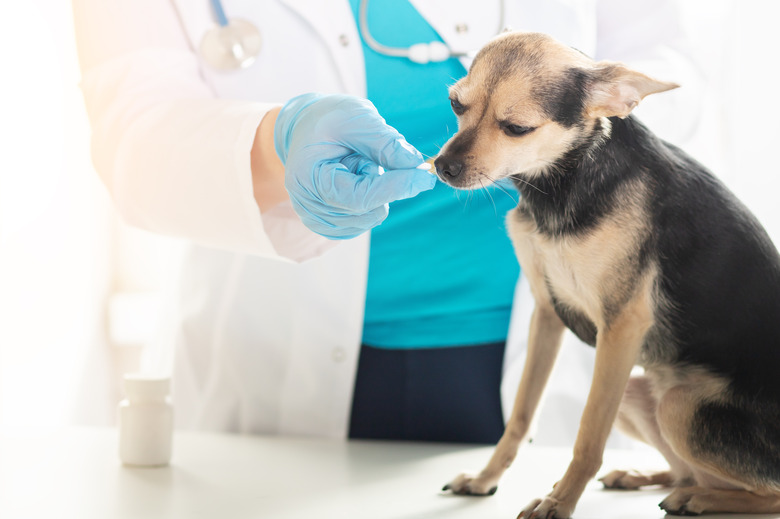Prilosec For Dogs
If heartburn stopped you from enjoying Taco Tuesdays at your local watering hole, your doctor may have given you Prilosec so you could get back to enjoying the spicy side of life. Although your dog doesn't dine on spicy chili and hot wings, your vet may still recommend giving them Prilosec. It will help protect them from developing intestinal and stomach ulcers.
Why do vets prescribe Prilosec for dogs?
Why do vets prescribe Prilosec for dogs?
Like people, dogs can develop ulcers in the stomach and intestines. This occurs if there is too much acid in the stomach or if something irritates the stomach lining. In dogs, the typical causes of ulcers include long-term use of anti-inflammatory drugs, gastrointestinal parasites, disease, trauma, or gastrointestinal blockages. Sold under the brand name of Prilosec, omeprazole for dogs prevents new ulcers from forming while healing existing ulcers.
Ideally, your dog will need Prilosec only until their existing ulcers heal and your veterinarian treats the underlying issue that caused them. In some cases, however, your dog may need to stay on the medication. If your dog frequently takes NSAIDs or corticosteroids, for instance, they may need to stay on Prilosec to protect them from developing ulcers in the future. Fortunately, Prilosec for dogs is inexpensive, so long-term usage won't break the bank. As of 2022, you can get generic 10-milligram omeprazole pills for only 15 cents apiece.
Some dogs shouldn't take Prilosec
Some dogs shouldn't take Prilosec
Though quite helpful for a lot of dogs, Prilosec isn't safe for dogs who are pregnant or nursing. You should also, of course, avoid Prilosec if your dog is allergic to it or has reacted negatively to it in the past. If your dog has liver disease, your veterinarian will watch them closely while he is taking Prilosec and may avoid this drug completely.
It's also important to understand that omeprazole for dogs can impact other medications. Because it changes stomach acidity, Prilosec may cause your dog to absorb ketoconazole, ampicillin, and iron more slowly. It keeps other drugs in the stomach longer, potentially increasing their effects. This applies to drugs like diazepam, phenytoin, and warfarin.
Using omeprazole for dogs for more than 15 days may alter their gastrointestinal biome as well. Generally, it is considered safe to use for four weeks. However, in some cases, the benefit may outweigh the risk of prolonged use.
How to give your dog Prilosec
How to give your dog Prilosec
Unless your veterinarian tells you otherwise, it's best to give your dog her Prilosec first thing in the morning before they have eaten anything. If you forget a dose, give it to your dog as soon as you remember. If it's almost time for the next dose, just skip the one you forgot. A typical omeprazole dose for dogs is between 0.25 and 0.5 milligrams of medication per pound.
It's important to take Prilosec pills whole rather than crushing or breaking them. If wrapping a pill in cheese or a hollow treat tricks your dog into swallowing it, you're home free. Dogs that are wise to the cheese trick, however, may do better with compounded Prilosec. A compounding pharmacy can put together your dog's exact dose of omeprazole in a capsule, suspension, or a flavored chewable. Since compounded omeprazole requires a prescription, ask your veterinarian to call that in for you.
Omeprazole side effects in dogs
Omeprazole side effects in dogs
After your dog starts taking Prilosec, they may vomit and could temporarily lose their appetite. They could also develop diarrhea and become quite flatulent. Though unpleasant for all involved, these side effects aren't serious and usually resolve on their own as your dog gets used to the new medicine. Some dogs won't experience these issues at all. Only use Prilosec for as long as your veterinarian determines it's needed.
In rare instances, your dog could develop a urinary tract infection or experience nervous system disruptions. These problems indicate a more serious reaction and require veterinary intervention. If your dog struggles with Prilosec, your vet may try other antacid medications such as famotidine for dogs, which is sold under the brand name of Pepcid. If your dog has been on Prilosec for 4 weeks or longer, you'll need to taper him off of it. Abruptly discontinuing the medication could result in a rebound of stomach acid production.


